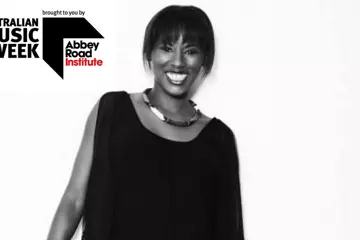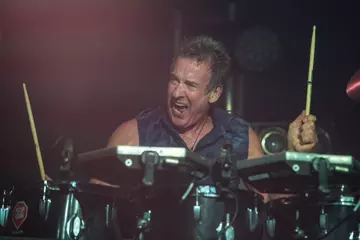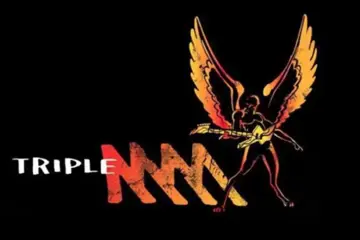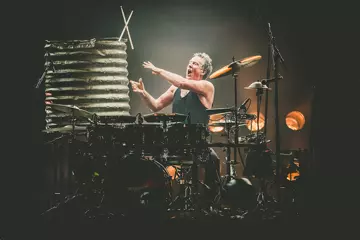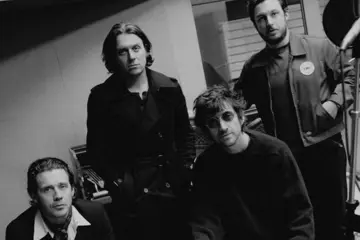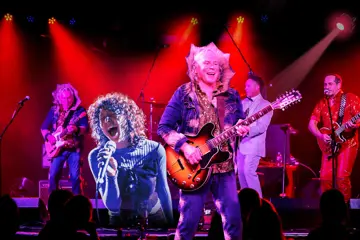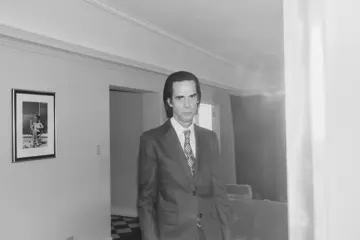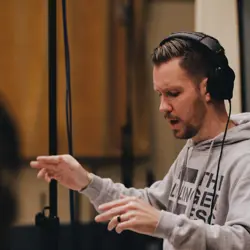 Randy Slaugh
Randy SlaughFrom first working on 'Periphery's 'Have A Blast' back in 2012 for P2, to composing and arranging sessions and orchestral music for the likes of Thy Art Is Murder, Silent Planet, Misery Signals, Voyager, Skyharbor, Architects, Unearth, TesseracT, and even the mighty Devin Townsend over the years since, Randy Slaugh's heavy music CV truly speaks for itself. Yet the Salt Lake City producer, keyboardist, and composer does so much more than just metal; he's worked with Indian artists, contestants from The Voice, produced music for episodes of Bridezillas, Catfish, Project Runway, Undercover Boss and more, alongside having his own band with Skyharbor guitarist Keshav Dhar and TesseracT singer Daniel Tompkins, White Moth Black Butterfly.
After mentioning him in our recent review of Four Year Strong's solid comeback effort, 'Brain Pain,' Randy and I got in touch to talk about his work over the years, his process, being on The Recording Academy voting board for the Grammy's, to some of his core pillars: working hard, challenging yourself and staying open-minded.
Bit of an easy question to start off with, Randy. What's a piece of advice that you now in 2020 would tell yourself back when you were first starting to get into recording strings and engineering music?
I think the best piece of advice I could give myself when I was starting off would be to put both feet in and commit 100% to a focused career path sooner than later. Music and art have always been a passion throughout my life, but I always had the mindset that there’s no money in music and I’d have to settle for a more practical career. I got a degree in advertising while playing in bands and producing music on the side, but my heart was always in music. It took me longer than it should have to realize that there’s money in every field of work, so why not choose something you’ll be passionate about and driven in? There’s, of course, a ton of risk involved, but a ton of opportunity and reward to be had from taking those risks.
Don't miss a beat with our FREE daily newsletter
Over the span of your career, what would you say was the most challenging session or release for you to conduct or engineer? And what things did that teach you moving forward?
Definitely Misery Signals' 'Absent Light.' The first half of the process was a breeze; I went to Ryan Morgan’s studio in Boise and worked with the band on composing the arrangements, which was a ton of fun. We had a pretty tight deadline after that to record everything with a string quartet remotely, and at the time, I had never recorded strings for a full-length record, and my workflow for getting everything transcribed, recorded and edited was extremely inefficient. Long story short, I ended up pulling a couple of all-nighters and just breaking even on costs to get everything delivered on time. It was a learning experience for sure and taught me which skills I needed to improve on and which tools I needed to invest in to be more efficient moving forward.
On the flip side, what was the smoothest, best flowing session or project you've been apart of? What elements about the music and the artists helped that be as strong as it was?
Working on the strings for the most recent Four Year Strong record was a completely different experience. Tasks that used to take me hours were lightning-fast thanks to having invested in better gear and software, hiring top-level session musicians, and overall having a better understanding of how to make a recording session go quickly and smoothly. A lot of that has come from experience, and from lots of trial and error over the years.
In hindsight, what remains your favourite song/album that you've worked on; a release that you were apart of in some way that you think has really held up and that you're fully proud of?
Honestly, both the ‘Periphery III’ and ‘Periphery IV’ records. I remember getting the initial pre-pro demos for those and being so blown away by how good the music was and being so excited to work on those. I’m really proud of how both of those records turned out.
Another one that really was a career highlight was Architects’ “Memento Mori.” Being asked to be a part of what was essentially Tom’s farewell song before he passed was and is a completely humbling experience.
Which release, out of the many bands you've worked with and records you've been apart of, was the one that came out and it felt like you had "made it"?
That’s an interesting thing. I genuinely don’t feel like I’ve had that moment yet, probably because my perception of “making it” is to reach an arrival point where you can stop “climbing,” so to speak, and I am still so far from my eventual goals of where I’d like to end up if that makes sense.
What would you say is the defining mentality or work ethic that you feel has kept you busy, paid the bills, and such? From the outside looking in on your career, it seems like a matter of saying 'yes' first and then working out how you'll do it, always keeping an open mind about projects and never turning your nose up at commercial TV or pop.
I think playing the long game and seeking out opportunities that will pay off, in the long run, has been a core part of my mentality. I’ve also had to make my own opportunities and be incredibly self-disciplined with time management. I’m now at a point where I’ve got a pretty steady pipeline of inbound work coming in, but at the start, I had to be pretty diligent with building a business and clientele from scratch - sending outbound cold emails, attending networking events and shows, making connections, asking for referrals, etc.
I've never interviewed someone before who is a member of The Recording Academy. So what's having that position like? And what responsibilities does that entail come every new Grammy season?
I remember hearing Joey Sturgis mention how producers and engineers with enough notable production credits can apply to join the Recording Academy voting board, so I sent in my application early last year, and was approved to join the voting board as well as the Producers & Engineers Wing. Being a member offers a lot of benefits, as well as responsibilities like voting each Grammy season, but most importantly, it’s allowed me to attend a lot of exclusive networking and social events where you’re rubbing shoulders with top-level music industry professionals. It’s honestly been one of the best career moves I’ve made and I highly recommend any producers and audio engineers out there to apply too!
Whether it’s composing music for a TV show like Undercover Boss or Bridezillas, or doing a session arrangement for a metal band, it feels like your sole intent is to always elevate the emotion of whatever the particular medium may be. To make it feel bigger. Is that an assessment of your work or approach that you'd agree with?
Absolutely! If I can take someone’s already amazing work and help convey the emotion they want to express even more effectively, I feel like I’ve succeeded.
From working on arrangements to Periphery's second album back in 2012 to the most recent album with your work on it, Four Year Strong's 'Brain Pain,' what's the most notable thing that's changed for you and your process, other than now having a much higher profile?
Sessions are much more organized and comfortable now. When I recorded the strings on ‘Periphery II,’ I had to figure out where to even find a violin player who could play the part, whereas now I’ve got my list of go-to session players I’ve worked with for years, as well as a lot better tools and resources.

Speaking of process, what's one thing that hasn't changed over the years? What's a methodology you take to recording or writing that is your own truth, in a way; something that you always do?
I think the main thing that hasn’t changed is that I continue to seek out working with artists that I am genuinely a fan of. Working with Devin Townsend, for example. I’ve been listening to his records since high school, so I approached the arrangements on his two records (‘Z2’ and ‘Casualties of Cool’) already with an understanding of what chord shapes and layering techniques to use to achieve his sound that’s he’s known for.
Likewise, are there any aspects or tiny details of older records you've worked on, like Misery Signals' 'Absent Light' or IKTPQ's 'Beloved,' or from that earlier period of your work in heavy music, that you would change if you could? Or maybe even just leave as they currently are?
If I could go back, of course, I’d use different arranging and recording techniques, but hindsight is always 20/20. I feel like I did the best that I could at the time with each project I’ve worked on, and each record has been a learning and growing experience.
Has working more with Daniel from TesseracT and Keshav from Skyharbor in White Moth Black Butterfly impacted your own writing for other artists outside of the band when taking on other jobs?
Since joining White Moth Black Butterfly, likewise, it’s been another growing experience that’s pushed me creatively, and I’m sure that’s rubbed off on my recent work, even if subconsciously.

Do you feel that a lot of session work and string arrangements fly under the radar for the general listening populace, when the focus can often be just on the band, and then the mix and master engineer(s) first?
There are definite advantages and disadvantages, for sure. It’s much less recognized than being a guitar player or mix engineer as you said, but at the same time, there’s way less competition, which has allowed me to really capitalize on a pretty unsaturated market and be able to build working relationships with artists who I might not have been able to work with otherwise. When I first contacted Periphery back in 2011, they probably would’ve turned me down if I offered to do a guest guitar solo or to mix their record, but offering to record strings was such a niche service that it became a foot in the door that started to lead to a lot more work.
Randy, I've always felt that once heavy music fans stop acting like their favourite bands only listen to heavy music, these genres will be a lot more open-minded and more welcoming. Due to the variety of artists and scenes you work with - from metal to Indian music, to artists off The Voice even - is that a sentiment that you'd agree with or do you instead have a different take?
I completely agree. I find it strange that people will limit themselves to one subgenre of music - it’s like if you were to only watch horror films and nothing else. Jordan Fish and Lee Malia from Bring Me the Horizon have mentioned that nowadays they listen to anything but metal for inspiration, and you can totally hear that in their recent music. I am obviously a big fan of heavy music, but I also love everything from hip hop to jazz to film scores to EDM to even some good country, and I’ll sometimes draw inspiration from some pretty unexpected sources. We're starting to see more and more of that today with bands like Issues, Loathe and Ocean Grove bringing some pretty fresh takes to the genre, and I'm hoping we see more of that in the future.
So what's on the bucket list for you, Randy, in terms of artists or projects that you'd like to be apart of in an engineer or a composer sense? What's an area you'd love to break into more?
I’d love to get more into scoring films. I’ve gotten a taste with TV licensing music and some short film work, but I am such a big fan of film music and would love to work my way more into that scene.



